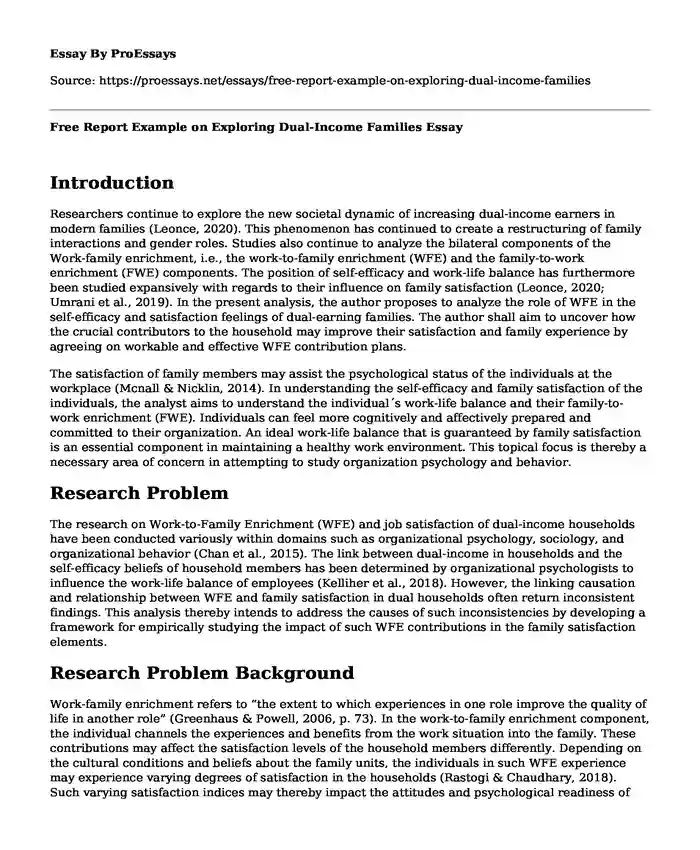Introduction
Researchers continue to explore the new societal dynamic of increasing dual-income earners in modern families (Leonce, 2020). This phenomenon has continued to create a restructuring of family interactions and gender roles. Studies also continue to analyze the bilateral components of the Work-family enrichment, i.e., the work-to-family enrichment (WFE) and the family-to-work enrichment (FWE) components. The position of self-efficacy and work-life balance has furthermore been studied expansively with regards to their influence on family satisfaction (Leonce, 2020; Umrani et al., 2019). In the present analysis, the author proposes to analyze the role of WFE in the self-efficacy and satisfaction feelings of dual-earning families. The author shall aim to uncover how the crucial contributors to the household may improve their satisfaction and family experience by agreeing on workable and effective WFE contribution plans.
The satisfaction of family members may assist the psychological status of the individuals at the workplace (Mcnall & Nicklin, 2014). In understanding the self-efficacy and family satisfaction of the individuals, the analyst aims to understand the individual´s work-life balance and their family-to-work enrichment (FWE). Individuals can feel more cognitively and affectively prepared and committed to their organization. An ideal work-life balance that is guaranteed by family satisfaction is an essential component in maintaining a healthy work environment. This topical focus is thereby a necessary area of concern in attempting to study organization psychology and behavior.
Research Problem
The research on Work-to-Family Enrichment (WFE) and job satisfaction of dual-income households have been conducted variously within domains such as organizational psychology, sociology, and organizational behavior (Chan et al., 2015). The link between dual-income in households and the self-efficacy beliefs of household members has been determined by organizational psychologists to influence the work-life balance of employees (Kelliher et al., 2018). However, the linking causation and relationship between WFE and family satisfaction in dual households often return inconsistent findings. This analysis thereby intends to address the causes of such inconsistencies by developing a framework for empirically studying the impact of such WFE contributions in the family satisfaction elements.
Research Problem Background
Work-family enrichment refers to “the extent to which experiences in one role improve the quality of life in another role” (Greenhaus & Powell, 2006, p. 73). In the work-to-family enrichment component, the individual channels the experiences and benefits from the work situation into the family. These contributions may affect the satisfaction levels of the household members differently. Depending on the cultural conditions and beliefs about the family units, the individuals in such WFE experience may experience varying degrees of satisfaction in the households (Rastogi & Chaudhary, 2018). Such varying satisfaction indices may thereby impact the attitudes and psychological readiness of individuals at the workplace.
Most modern family structures comprise of dual-income earners (Chung & Lippe, 2018). As such, issues like family satisfaction and work-life balance require to be handled while respecting this new family dynamic. Compared to single income source families, the dual-income earners require work-life balance considerations for two independent-yet-interlinked lifestyles of employees. The family dynamic and self-efficacies of such independent earners within the family strand may inform the new trend in workplace psychology in a continuously shifting family characteristics (Chung & Lippe, 2018).
Conclusion
Analyzing the satisfaction of dual families through open communication and WFE contributions may serve to increase both individual and familial links (Rooney & Gray, 2019). Such improved links may thus allow the members of the family to open better about the cognitive and emotional aspects of both the family and workplace (Chan et al., 2015). The individuals may also improve their self-efficacy at the workplace as they will experience safety satisfaction emotions.
Bibliography
Chan, X. W., Kalliath, T., Brough, P., Siu, O.-L., O’Driscoll, M. P., & Timms, C. (2015). Work–family enrichment and satisfaction: the mediating role of self-efficacy and work–life balance. The International Journal of Human Resource Management, 27(15), 1755–1776.
https://doi.org/10.1080/09585192.2015.1075574
Chung, H., & Lippe, T. V. D. (2018). Flexible Working, Work–Life Balance, and Gender Equality: Introduction. Social Indicators Research.
https://doi.org/10.1007/s11205-018-2025-x
Greenhaus, J. H., & Powell, G. N. (2006). When Work And Family Are Allies: A Theory Of Work-Family Enrichment. Academy of Management Review, 31(1), 72–92.
https://doi.org/10.5465/amr.2006.19379625
Kelliher, C., Richardson, J., & Boiarintseva, G. (2018). All of work? All of life? Reconceptualizing worklife balance for the 21st century. Human Resource Management Journal, 29(2), 97–112.
https://doi.org/10.1111/1748-8583.12215
Leonce, T. E. (2020). The Inevitable Rise in Dual-Income Households and the Intertemporal Effects on Labor Markets. Compensation & Benefits Review, 52(2), 64–76.
https://doi.org/10.1177/0886368719900032
Mcnall, L., & Nicklin, J. (2014). Work-Family Enrichment. Encyclopedia of Quality of Life and Well-Being Research, 7215–7218.
https://doi.org/10.1007/978-94-007-0753-5_4054
Rastogi, M., & Chaudhary, R. (2018). Job crafting and work-family enrichment: the role of positive intrinsic work engagement. Personnel Review, 47(3), 651–674.
https://doi.org/10.1108/pr-03-2017-0065
Rooney, C., & Gray, J. (2019). Changing Family Dynamics and In-Work Benefits. Social Policy and Society, 19(2), 185–205.
https://doi.org/10.1017/s1474746419000277
Umrani, W. A., Siyal, I. A., Ahmed, U., Arain, G. A., Sayed, H., & Umrani, S. (2019). Does family come first? Family motivation-individual’s OCB assessment via self-efficacy. Personnel Review, 49(6), 1287–1308. https://doi.org/10.1108/pr-01-2019-0031
Cite this page
Free Report Example on Exploring Dual-Income Families. (2023, Nov 02). Retrieved from https://proessays.net/essays/free-report-example-on-exploring-dual-income-families
If you are the original author of this essay and no longer wish to have it published on the ProEssays website, please click below to request its removal:
- Should Assisted Suicide be Legalized for the Terminally Ill in All 50 States?
- Paper Example on Chinese Parenting Stereotype
- Analysis and Reflection Paper on Media Coverage of Asian American Women
- Patient Care Assistant Paper Example
- Retirement Planning: Make the Most of Employer, Savings and Social Security Packages - Essay Sample
- Essay Sample on EZ-Pleeze: Maximizing Employee Performance & Productivity
- Experiencing Autism: The Challenges, Isolation, and Need for Change in Utah - Free Essay







